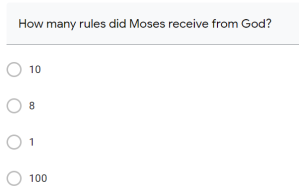Using multiple choice questions (MCQs) with students has become more popular, probably due to online systems that can provide pre-made questions or that they mark themselves; both saving teachers time.
However, if you wish to write your own, research suggests that you follow some simple guidelines. I will be looking at these and suggesting how you can differentiate using multiple choice quizzes by showing how you can increase complexity. This might be appropriate when considering the different year groups or students that you teach or the purpose of the quiz. If you want it to be quick and ‘easy’, choose the first types of question.
The key for differentiation using MCQs is to try increase challenge for students in the subject content rather than making the questions more complex in terms of procedure or literacy.
Research suggests:
- 3 or 4 possible answers are the optimum amount needed
- Not to use negative statements as much as possible e.g. which of these is NOT a feature of prayer?
- Keep the incorrect answers linked to the topic, logical and possible, in that they are potential answers (distractors) rather than silly or obviously incorrect
- Keep the answers to roughly the same length. We tend to write longer answers for the correct answer so ensure this isn’t always the case.
- Randomise the order or the position of the correct answers so students can’t learn qu 1 is b, qu 2 is d etc
- Avoid using ‘all of the above’ options
The following suggestions are roughly in order of increasing difficulty:
-
Simple question, one word answers
Sticking to tier 2 vocabulary keeps things simple and with one ‘word’ answers these can be quick and easy to answer for students.


This swaps ‘rules’ for ‘commandments’ which is a slightly more complex way to check vocabulary understanding

Students need to know what ‘Decalogue’ means and then know what the answer is
Simplify: Make the distractors very obviously wrong. This may be appropriate in some educational settings, for some students.
Extend: Adding in tier 3 vocabulary means you are also testing knowledge of keywords which requires a ‘double step’; understanding the keyword and knowing the correct answer.
Extend: Answers that are more than one word
2. Identify the incorrect statement
These are more challenging as they require students to carefully read all the answers rather than scan for the answer that they know is correct.

3. The best answer
This is more complicated because it requires students to read carefully to identify the subtle differences between the answers and know which is 100% correct rather than partially correct or is the overall ‘best’ answer. These are complex as the distractors can be correct but less likely or important.

4. Extended explanations
Using extended explanations are appropriate in some subjects and are especially useful for A level where more complex, (literacy based) reasoning is needed.

Extend: Use more complex subject language (tier 3) in the question and answers.
Strategies for differentiating all the above
5. Multiple correct answers
This is probably the easiest way of increasing challenge in content without increasing the literacy demands. Students need to select multiple correct answers.

Extend: Don’t tell students how many of the answers are correct. This makes it significantly more challenging.
6. Give the option ‘I don’t know yet’
One of the key issues with MCQs for assessing knowledge is that students can guess and they always have a 1 in 3/4 chance of getting the answer right. If you really don’t want them to guess so you have true picture of what they do/don’t know, adding ‘I don’t know yet’ can help. However they need to be trained to use it! It can go against the whole ‘try your best’ mantra that students may have had drilled into them as they are admitting they don’t know when they could actually guess and might get it right. We spend time going through this with them.

7. Carefully crafted distractors
This is where knowledge of potential misconceptions is really useful. There are certain topics/questions with students where there are often common misconceptions. Using these misconceptions as your distractors makes the question more challenging because instinctively students might go for the misconception answer/s.

Further reading
Blake Harvard is the KING of MCQs and he has several blogs on them including different ways of using them for diagnosis:
- https://theeffortfuleducator.com/2018/09/26/wabmcq/
- https://theeffortfuleducator.com/2018/05/15/maximizing-the-effectiveness-of-multiple-choice-qs
- https://medium.com/eedi/what-makes-a-good-diagnostic-question-b760a65e0320
- https://cft.vanderbilt.edu/guides-sub-pages/writing-good-multiple-choice-test-questions/
- https://edu.rsc.org/ideas/how-to-use-multiple-choice-questions/4011481.article
- https://www.k-state.edu/ksde/alp/resources/Handout-Module6.pdf